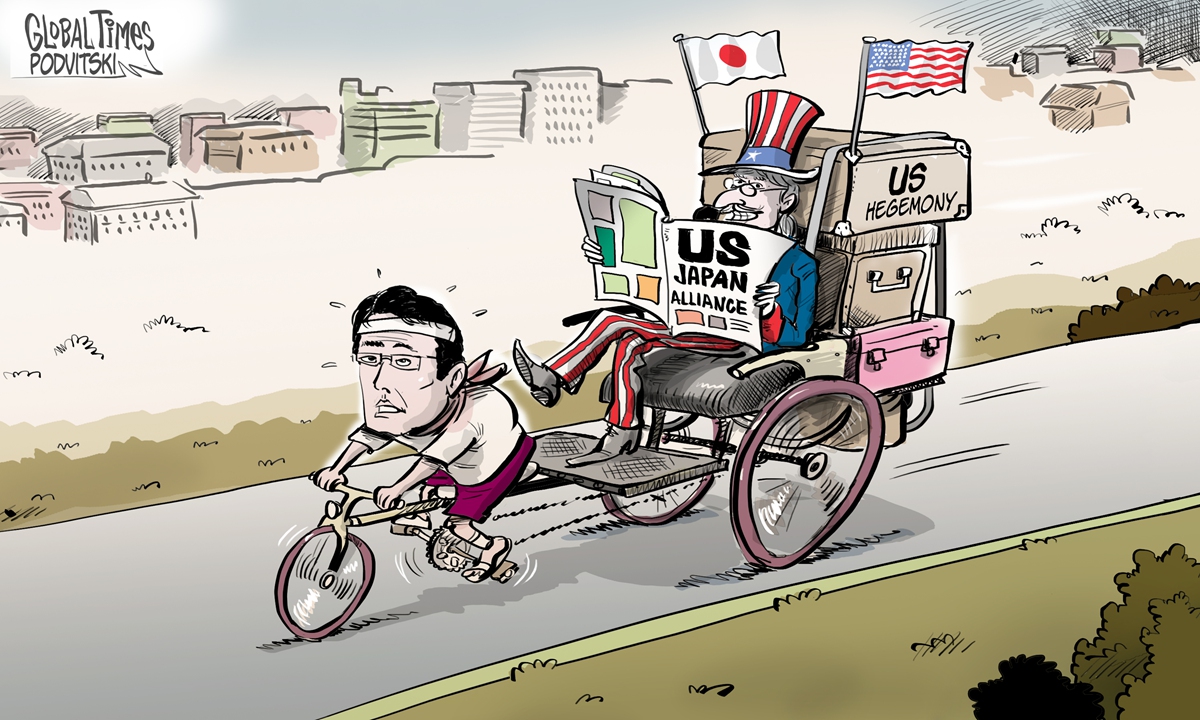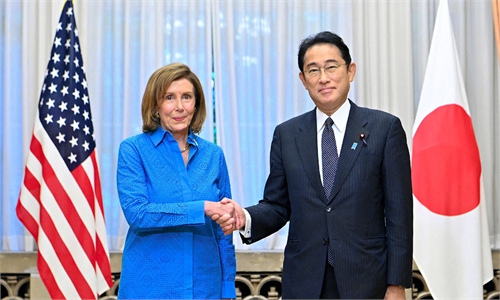
Well-trained pawn Illustration: Vitaly Podvitski
It has been noticed by the media that Nancy Pelosi did not mention "Taiwan" even once when she made public appearances in South Korea. According to reports, when she met with the speaker of the National Assembly of South Korea, and when she spoke with South Korean President Yoon Suk-yeol on the phone, neither side talked about her visit to Taiwan island. However, when Pelosi arrived in Japan, she immediately changed her face and became much more high-profile. She said at a press conference that her trip to Asia was not meant to change the status quo in the region, but the US "will not allow" the Chinese mainland to "isolate Taiwan."
The reason for this contrast is largely because Pelosi believes she has found an audience, or "confidant," in Japan. In fact, it is the case. But it must be said that being a "confidant" of the Washington politician - a political pestilence with no bottom line - will only bring shame and disaster to Japan.
The Japanese side has shown closeness to Pelosi, which seems deliberate and abrupt. More importantly, it shows that the Japanese government cannot tell black from white on the Taiwan question and is extremely irresponsible. Japanese Prime Minister Fumio Kishida had a breakfast meeting with Pelosi on Friday. In a speech to the media, Kishida pointed a finger at China, condemning China's missile drills as a "serious problem that impacts our national security and the safety of our citizens." He also said that Japan and the US will "jointly work to ensure peace and stability" in the Taiwan Straits. Such statement is a huge irony.
If Japan is concerned about the peace and stability of the Taiwan Straits because of its proximity, it seemingly makes sense. But this being the case, shouldn't Japan firmly oppose and prevent Pelosi from visiting Taiwan? But when the situation of the Taiwan Straits was stirred up by the news of Pelosi's visit, the Japanese official said that Japan "is not in a position to comment." When Pelosi caused substantial damage to the peace and stability of the Taiwan Straits, Japan and the perpetrators together blamed the victim. What is the point of this? Is such a response tailor-made for China?
In fact, Japan is the least qualified to make irresponsible remarks on the Taiwan question. It bears historical liability for Taiwan. Japan not only had long-term colonial rule over the Taiwan island, but it also has not thoroughly reflected on it. On the Taiwan question, Japan has violated the Cairo Declaration, Article 8 of the Potsdam Declaration, and the UN General Assembly Resolution 2758, and such moves are unreasonable. Japan has disregarded the serious political commitments to China in the four political documents including the China-Japan Joint Communiqué, which is disloyal. Japan has given up diplomatic autonomy and completely followed in Washington's strategic footsteps, which is unwise. Japan has also failed to make a reflection and learn lessons from history, and instead, it has disregarded regional countries' expectations for peace and stability, which is unethical.
In addition, Japan wants to take the opportunity to fan the flames and exploit benefits. In response to Japan's claim that five ballistic missiles fell in its so-called exclusive economic zone during the PLA's military exercises on Thursday, China has repeatedly stated that there is no delimitation between the relevant waters surrounding China and Japan, so there is no such thing as a so-called Japanese exclusive economic zone.
Even if there is by any means, isn't conducting military exercises in the exclusive economic zones of other countries what the US and Japan frequently tout as "freedom of the seas" and the "rules-based" international order?
Japan's move is very speculative. In addition to trying to use the "exclusive economic zone" to set a trap for China, it attempted to politically manipulate China's legitimate and necessary military exercises, and exaggerate the "China threat," so as to pave the way for Japan's military expansion and constitutional revision. To put it bluntly, Japan now is exploiting all opportunities to break the shackles of the pacifist constitution and promote Japan's "normalization of national defense" and its ambition to become a major military power. However, if it makes an issue of China's core interests, it will definitely fail.
Regarding Japan, the Chinese side has sent a very clear message and responded firmly. China strongly urges Japan to abide by the principles of the four political documents between China and Japan and its political commitments on the Taiwan question, stop interfering in China's internal affairs, handle Taiwan-related issues prudently and properly, and not go further down the wrong path. If Japan follows the US to provoke China's core interests, then it is likely to suffer a more direct and stronger counterattack from China. It is easier to counter Japan than to counter the US. In this regard, the Japanese side should not have any illusions.
As for the PLA's military exercises around the Taiwan island, some Japanese media claimed that the exercises may also aim at another target - Japan. Japan is just exposing itself by concealing itself. If Japan truly adheres to the one-China principle, why does only Japan, among regional countries, feel its security is affected by the PLA's move to deter the US-Taiwan collusion? If Japan tries to interfere with China's great cause of reunification under the banner of "what's happening to Taiwan is what's going on with Japan," its sense of insecurity is of its own making. Anyone who wants to meddle in China's domestic affairs will inevitably have to pay the price.

